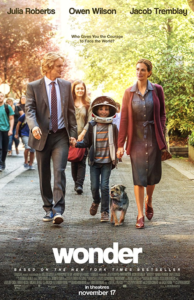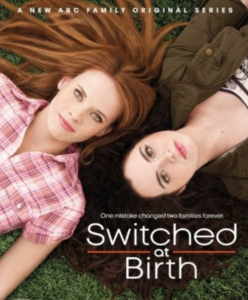*repost from February 25, 2018*
When I get a rare bit of time to relax, I sometimes just want to put my feet up and watch some TV. And when those flashy, at times 100-level volume, commercials come on, my interest is usually only peaked when a new movie trailer popped on the screen . Well …trailers or one of my staple favorites commercials like the Swiffer commercials with Lee and Morty comes on for a good laugh. I always like to see what stories are being told in film, and what may be worth a watch. Whether I’m in need of a good laugh or cry, a love story or comedy, or some intense action–never a horror film since I’m too easily spooked–trailers are my swipe left or swipe right decider.
In the last couple years, I’ve noticed what feels like a push in films that have led characters and plot lines focused on chronic illnesses and disabilities. You would imagine I would overwhelmingly love seeing this, after all, I founded InvisiYouth Charity where I’m constantly pushing and motivating for equal representation. But as I watch these trailers, the feeling is mixed between a quick boost of excitement and a similarly immediate drop of frustration.
I feel flooded with a ping-pong of thoughts:
- Wow, finally a film bringing a lead character with a rare, not main stream-known disease.
- Are there seriously no disabled actors that can actually be hired to actually portray the actual illness or disability?
- Representation is great for young adult health conversations and awareness!
- Does every chronically ill or disabled person in a movie have to be the center of a love story of overcoming some massive life crisis? Can’t they just be a character with a storyline that happens to be sick or disabled?
- It’s brilliant getting conversations going about young adults living with illness. They are just young adults like anyone else too.
- These actors aren’t acting like an authentic sick or disabled person. Someone with that illness definitely cannot do that, it’s not true.
For me, it’s a Catch 22 scenario with my sentiments on what truly matters most: awareness or accuracy. And maybe I maintain an overly positive mindset and believe that both are valuable, and try to find the best in what is coming out in the media. I want to believe that, while I have a ton of issues with the inaccuracy of portrayals and lack of diverse casting, there can be some good in this wave of films addressing characters with disabilities or illnesses, especially for the young adults that are watching them. Just in the purity of having more people watching films showcasing lives lived by people with disabilities and illnesses; that while the health stories of these individuals may be more complex and unique, but their life stories are just like anyone else. The more eyes we can get from them general public to see this community, the more understanding and change that can arise from it.
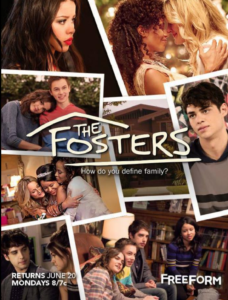
If no films were coming out with characters living with chronic illnesses or disabilities, then the ease in which people can talk about the health subjects diminishes. When I suggest to young adults talking with friends about their health struggles, I tell them sometimes it can help to show their friends what that daily journey is like.
And often, young people tell me they want to reference what’s sort of similar to their life and portrayed in the media, the films and TV shows they watch, with characters living with similar conditions.
You can have young people tell their friends to watch the 5th season of Freeform’s THE FOSTERS because a main character, Jesus, is living with a traumatic brain injury (TBI), and the show is displaying an entire arc about the process of recovery personally, socially, academically and emotionally. Actor, Noah Centineo, and the writers, talked often about the preparation that went into bringing accuracy and justice to this plot line.
Then we go to another show, Canadian-born (and globally famous) teen TV drama, Degrassi, where so many different story arcs for decades showcase what various illnesses and disabilities could look like for teens. From characters living with mental health struggles like depression and OCD, to illnesses like leukemia and cystic fibrosis, DEGRASSI prides itself on tackling topics that show diversity in all its forms. While hiring actors living with these health struggles lacks, Degrassi breaking stigmas to open the conversations in real life, to create more understanding, open minds and change.
However, a line needs to be drawn when it comes to this wave of media using characters with illness or disability to romanticize or dramatize the storylines.
Health struggles should not be a plot device to add more complexity to a storyline or character, because it reality, that is not how it works. As someone living with an illness, I don’t get the luxury to “turn it on or off” when it suits the situations in my life…and there certainly isn’t any romantic background music playing when I have to tell people about my health struggles. This is where accuracy completely disintegrates and it can tarnish an entire film, when these storylines lack realism. So yes, while I can be happy for opening the door of conversation and normalizing the visibility of illnesses and disabilities mainstream, they are done so without accuracy. And that’s should not continue.
Last year, films came out and addressed lead characters living with disability and illness…but the characters and storylines where not only lacking in accuracy to the daily life of someone with that health struggle, but also the actors were able-bodied and healthy.
That inaccuracy may not be apparent to audiences not living with health issues, but for anyone living with any sort of illness or disability, the films and actors are like neon lights pointing out the wrongs. With WONDER, while a beautiful storyline, it has an able-bodied character portraying the genetic disorder Treacher Collins Syndrome.
And with EVERYTHING, EVERYTHING, the immune-deficiency disease SCID, Severe Combined Immunodeficiency, is also portrayed by an actress not living with illness—and when this film was coming out, all over our twitter we saw reactions from the Spoonie community talking about the major inaccuracies of the illness portrayal and character lifestyle. 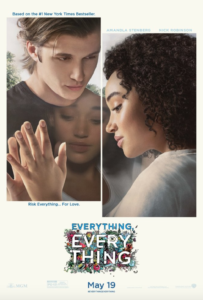 “It’s so unrealistic” I would hear youth say. What made it feel even worse was that a general audience would never notice the flaws and assume this is how relationships and life can look for any of their friends with illnesses or disabilities. Stereotyping the “illness lifestyle” is what continues to enable ignorance, lack of understanding and empathy for change.
“It’s so unrealistic” I would hear youth say. What made it feel even worse was that a general audience would never notice the flaws and assume this is how relationships and life can look for any of their friends with illnesses or disabilities. Stereotyping the “illness lifestyle” is what continues to enable ignorance, lack of understanding and empathy for change.
Even a film that I enjoyed, THE FAULT IN OUR STARS, lacks realism and has two able-bodied actors without illness portraying osteosarcoma/subsequent amputation and Stage 4 Thyroid Cancer. I enjoy the film and book as pieces of fictional storytelling. I love the love story of the two characters, the satire in which teenage illness is discussed among all the characters, because while not accurate at times, the tone is so similar to my outlook. I tell friends this movie has moments that are relatable to the experience, and it is a film that can get my friends to feel comfortable asking me questions about my health because of that.
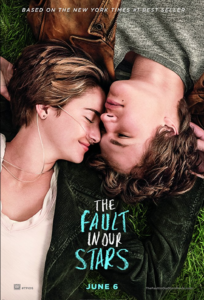 In a way, films and TV shows that have what I call “the health struggle plot line” need to be used as talking points or references to help bring that de-stigmatizing conversation WITH A DISCLAIMER. There needs to be a ‘fine print’ comment every time you want to use a film or character to reference…saying “well this character is living life with an illness similar to mine…yes, it’s not super accurate, but it can show you a bit of what that feels like for me.” I always use the disclaimer method, when using media and film to try and explain to friends what my relationships and lifestyle can be like, and that can feel disheartening because there’s so much in daily life I need to teach others around me as I adapt, I shouldn’t have to do this with film portrayals too.
In a way, films and TV shows that have what I call “the health struggle plot line” need to be used as talking points or references to help bring that de-stigmatizing conversation WITH A DISCLAIMER. There needs to be a ‘fine print’ comment every time you want to use a film or character to reference…saying “well this character is living life with an illness similar to mine…yes, it’s not super accurate, but it can show you a bit of what that feels like for me.” I always use the disclaimer method, when using media and film to try and explain to friends what my relationships and lifestyle can be like, and that can feel disheartening because there’s so much in daily life I need to teach others around me as I adapt, I shouldn’t have to do this with film portrayals too.
In my opinion, it’s disheartening that in 2018, we still have to put a disclaimer to these storylines, that they cannot be made accurately. And yes, let’s giving the benefit of the doubt because everyone’s experience with an illness or disability is different. Two people with the same diagnosis do not respond, treat, or adapt to life the same ways…so one portrayal in a film may match up exactly to my life, but not someone else’s with my diagnosis. That’s the way uniqueness in society works, so it’s all about finding common ground and working from there.
Look at a movie coming out next month, MIDNIGHT SUN, where the female lead is living with a rare genetic disorder, Xeroderma Pigmentosum. Is it wonderful that rare diseases are FINALLY getting some screen time and going into mainstream films so more people can talk about it? Absolutely! But how much does it suck that the portrayal is by an actress without the illness, and the illness is romanticized, instead of realistically portrayed? A lot!
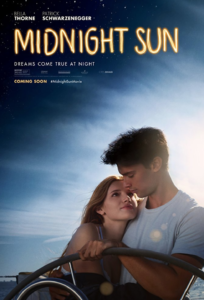 To see films using illness as a plot point for romance and drama, that is what needs to stop because it’s not realistic. How about films just happen to have their lead characters living with an illness or disability, and something else causes the drama or romance to build? That would be interesting AND original…two things films are always looking to create.
To see films using illness as a plot point for romance and drama, that is what needs to stop because it’s not realistic. How about films just happen to have their lead characters living with an illness or disability, and something else causes the drama or romance to build? That would be interesting AND original…two things films are always looking to create.
But to me, what matters most, what it truly gets down to, is the lack of opportunity for actors with disabilities or illnesses to portray what is this life and journey accurately. So often, characters are developed for a film or TV show where they are designed to have an illness or disability and the actor that gets the part has zero connection to it.
They are not chronically ill or disabled and have to “portray” the role without any personal experience. It seems so contradictory to not hire an actor with a disability to portray a character with a disability. There are so many talented young people around the world living with chronic illnesses and disabilities that are actors and they should be the first choice for hire! These individuals should be the ones on the casting list, and it’s for not just accuracy in the storyline, but also it continues to build inclusivity in the industry.
And even more disheartening is how true this is when it takes me FOREVER to come up with just a couple examples in my head of TV shows or films with accurate casting. It shouldn’t take much effort to list off accurately casted films or shows. When the industry says, “oh there aren’t that many actors to fill the need” or “it would be hard to assist or adapt to these actors” I have to call their bluff and say that’s such a ridiculous copout. Heck, our latest Celebrity Ambassador, Melissa Johns, is a British disability activist and actress, and she’s such a talented actress!
Look at the positives when a film or show are accurately casted. The Freeform show SWITCHED AT BIRTH, was centered around many characters that were deaf or hearing impaired (the actress Katie Leclerc who portrays one of the protagonists, Daphne, lives with hearing loss due to Meniere’s disease, an illness also given to her character). The variety of communication like American Sign Language, is a great example of how to integrate differences between those living with deafness or illness and those who do not. And bonus… actors like Katie Leclerc, Sean Berdy, Ryan Lane, and Marlee Matlin, have actual hearing impairments so it was accurate and inclusively casted! The show feels even more authentic, passionate, and inspired because the characters are portrayed by individuals with the exact illness and disability.
Wouldn’t the film industry want to bring that much truth and emotion out of their audiences, bring that much notoriety and conversation and impact society enough to make lasting change?
I think it should, and that is the main point of contention in this international debate.
That is why I really want to believe in the positives of both seeing all this representation of illness/disability in films and TV, while also seeing the benefits of accuracy in storylines when illness or disability are being brought into the fold.
While you can either find representation or accuracy more important in films, what truly matters is that there needs to be more opportunity for actors with illnesses and disabilities. There needs to be more roles written to portray this community, with requirements of accurate casting. There needs to be more opportunities for these fantastic actors to be hired to show their talent playing any roles, whether their illness or disability is the focal point or not.
My truest goal is that we can see films or TV shows that have actors with illnesses and disabilities on a regular basis, a true progression that needs to be made to show all the facets of societal diversity.
~Dominique


